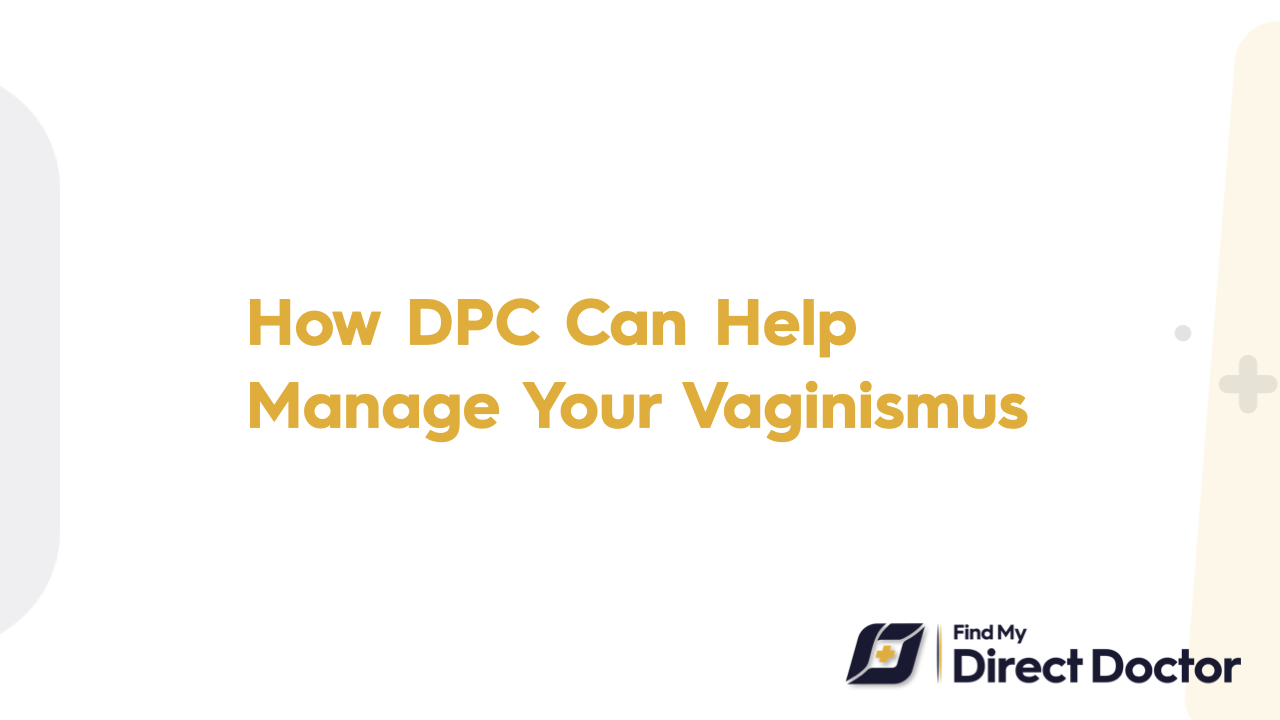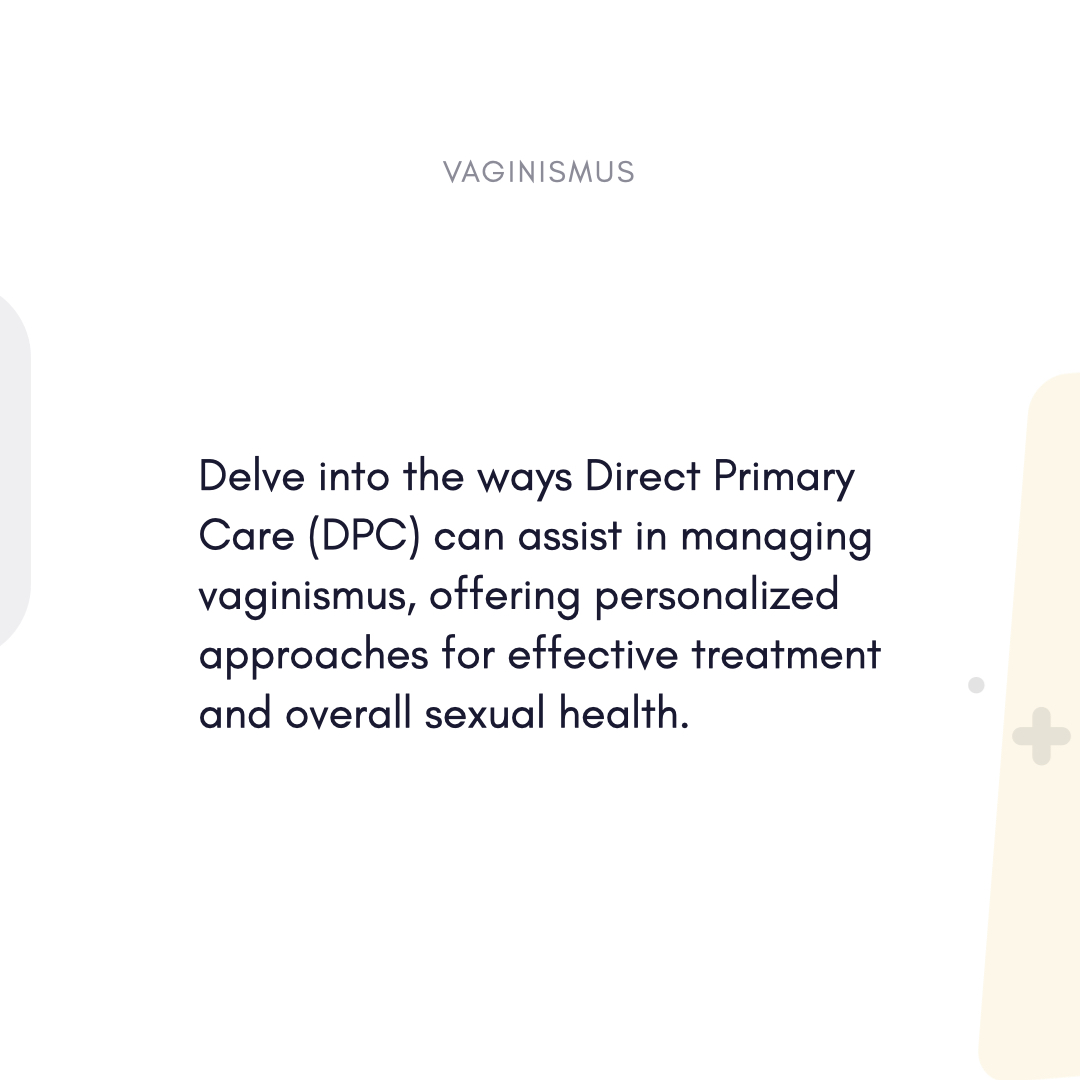Vaginismus and Direct Primary Care (DPC): Compassionate Care for Intimate Health
You know the isolation of vaginismus if you have ever experienced the emotional toll of avoiding intimacy or the acute pain of involuntary vaginal muscle spasms. Affecting 1–6% of women, this disorder can undermine self-esteem and relationships. Direct Primary Care (DPC) presents a complete, patient-centered solution for vaginismus, combining multidisciplinary treatment, cost transparency, and techniques to restore comfort and confidence.

Recognising Vaginismus and Its Effects
Vaginismus causes involuntary pelvic floor muscular contraction that results in pain during penetration—tampons, sex, tests.
- Anxiety, intimacy's fear.
- Relationship strain, difficulties with fertility.
Origins:
- Psychological (anxiety, trauma).
- Physical (including surgeries and infections).
DPC's Transformational Effect Vaginismus Treatments
Under the membership model known as Direct Primary Care (DPC), patients pay a monthly fee—usually 50 USD–150 USD—for unlimited access to their main care physician. For those with vaginismus, this means no waiting months for experts, no surprise bills, and treatment emphasizing your emotional and physical healing.
Here's why DPC distinguishes itself:
1. Timely, interdisciplinary coordination
DPC doctors follow ISSWSH policies including:
- Gentle, patient-driven pelvic tests.
- Referrals to PTs for techniques of pelvic floor relaxation.
- Mental health integration: CBT for lessening of anxiety.
2. Accessible, All-Inclusive Therapy
- By offering vaginal dilator kits at cost (50 USD instead of 150 USD+) DPC clinics help to lower costs.
- Bargaining for cash rates between 75 USD/session and 200 USD with pelvic floor therapists.
- Providing sex therapist telehealth sessions.
3. Constant emotional support
Patients can:
- Change their treatment plans during flare-ups by 24/7 access to your DPC doctor.
- Use mindfulness apps for training in relaxation.
- Navigate resources for relationship counseling.
DPC Benefits for Vaginismus Patients
Customized Healing Strategies
- Each visit, DPC doctors spend 30 to 60 minutes developing plans including:
- Gradual desensitizing techniques are used in dilator therapy.
- Biofeedback: Instruction to relax muscles.
- Lidocaine gel: For PT pain control.
Financial Restraints
- No co-pays for regular progress visits.
- Sessions of therapy between 60 and 70% less than insured rates.
- Prevention of expensive ER visits by means of proactive treatment.
Whole Health Integration
DPC tackles:
- Education about sexual health: Methods of partner communication.
- Referrals for somatic therapy or EMDR trauma-informed treatment.
- Fertility support: Work with reproductive experts.
Stories from Real-Life Success
- Case 1: Emma, 29, underwent DPC-coordinated PT + CBT six months ago and experienced pain-free intimacy.
- Case 2: Using DPC's self-pay network, 35-year-old Sarah saved 5,000 USD on therapy, so restoring her marriage.
Questions: DPC and Vaginismus
- Q: Is vaginismus treatable?
- A: Sure! Most women get notable improvement with regular treatment.
- Q: Is DPC within budget without insurance?
- A: Yes. Members save in PT, counseling, and supplies.
- Q: Should a specialist be needed, what then?
- A: A DPC arranges discounted rates with pelvic pain clinics and therapists.
DPC Provides a Win for Vaginismus Patients
The International Society of the Study of Women's Sexual Health stresses a biopsychosocial approach. DPC offers this via:
- Getting triggers early on: illnesses, hormonal changes.
- Teaching pelvic anatomy and relaxation helps empower patients.
- Expanding cost simplification: All coordinated care is covered by one monthly fee.
Conclusion
Vaginismus need not define your relationships or value. Every session, every breakthrough, every step toward freedom—DPC gives you a partner who listens, coordinates, and prioritizes your healing.






